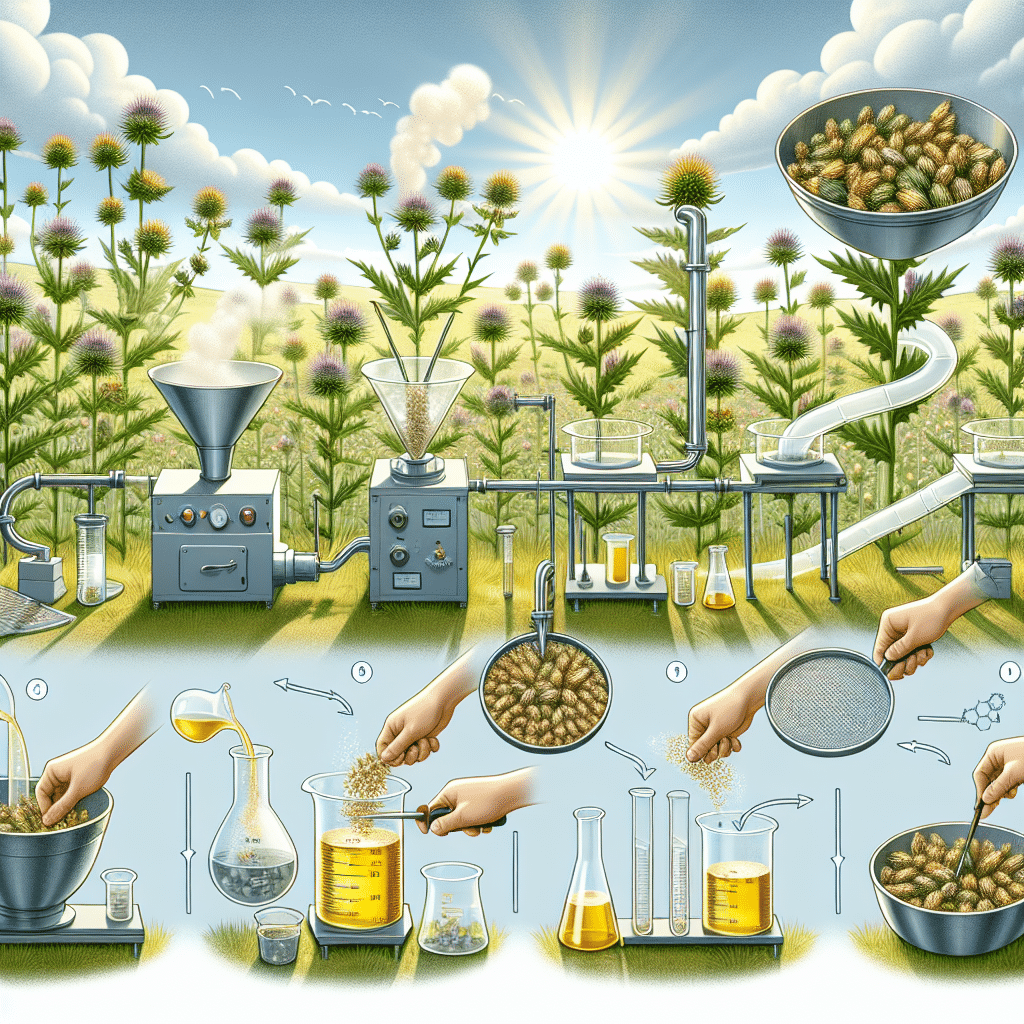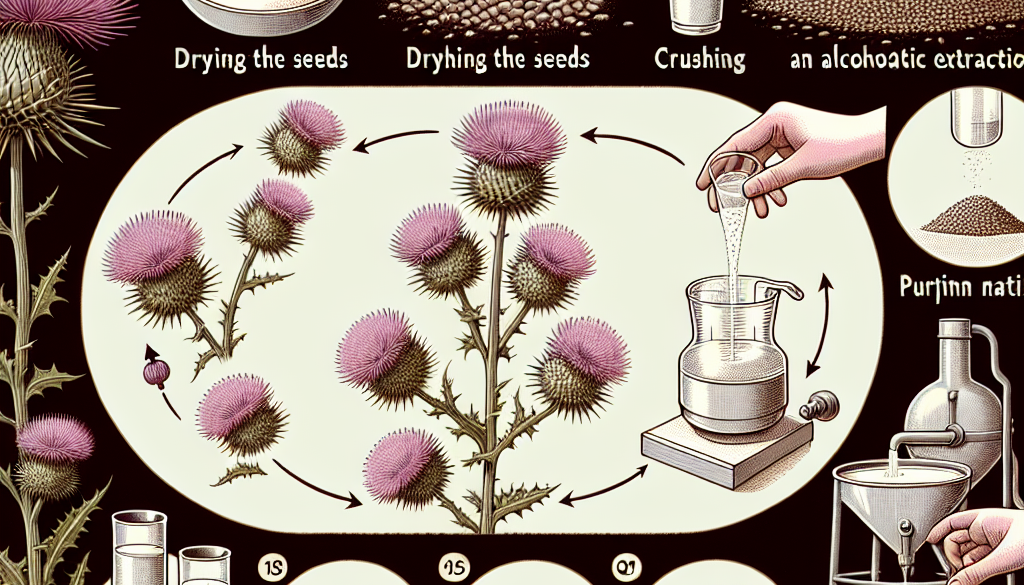How to Extract Silymarin from Milk Thistle
-
Table of Contents
- Extracting Silymarin from Milk Thistle: A Comprehensive Guide
- Understanding Silymarin and Its Benefits
- Harvesting Milk Thistle Seeds
- Preparation of Milk Thistle Seeds
- Methods of Silymarin Extraction
- Solvent Extraction
- Supercritical Fluid Extraction
- Ultrasonic-Assisted Extraction
- Refining and Purifying Silymarin Extract
- Quality Control and Standardization
- Applications and Research on Silymarin
- Conclusion: The Importance of Effective Silymarin Extraction
- Discover ETchem’s Protein Products
Extracting Silymarin from Milk Thistle: A Comprehensive Guide

Milk thistle, scientifically known as Silybum marianum, has been used for centuries as a natural remedy for liver and gallbladder disorders. The active compound in milk thistle, silymarin, is a flavonolignan complex with antioxidant and anti-inflammatory properties. Extracting silymarin from milk thistle is a process of interest to both researchers and herbal supplement manufacturers. This article will delve into the methods used to extract silymarin, ensuring that the end product is of the highest quality and efficacy.
Understanding Silymarin and Its Benefits
Silymarin is a mixture of flavonolignans, including silybin, isosilybin, silydianin, and silychristin. It is primarily known for its hepatoprotective effects, which help protect the liver from toxins and promote liver regeneration. Studies have also suggested that silymarin may have anticancer properties, and it is often used in supplements aimed at supporting liver health.
Harvesting Milk Thistle Seeds
The first step in extracting silymarin is to harvest milk thistle seeds. The seeds contain the highest concentration of silymarin and are typically collected when the plant has fully matured and the flower heads have dried. Proper harvesting techniques are crucial to ensure the seeds are not contaminated and are of high quality.
Preparation of Milk Thistle Seeds
Once harvested, the seeds must be prepared for extraction. This involves cleaning and, in some cases, grinding the seeds to increase the surface area for extraction. The preparation process is vital for maximizing the yield of silymarin.
Methods of Silymarin Extraction
There are several methods used to extract silymarin from milk thistle seeds. Each method has its advantages and disadvantages, and the choice often depends on the scale of production and the desired purity of the silymarin extract.
Solvent Extraction
Solvent extraction is one of the most common methods for extracting silymarin. It involves using a solvent, such as ethanol or acetone, to dissolve the silymarin compounds from the milk thistle seeds. The process typically includes the following steps:
- Soaking the ground seeds in the solvent for a specified period.
- Filtering the mixture to separate the liquid extract from the solid residue.
- Evaporating the solvent to obtain a concentrated silymarin extract.
This method is effective but can involve the use of toxic solvents that must be carefully handled and disposed of.
Supercritical Fluid Extraction
Supercritical fluid extraction (SFE) is a more advanced and environmentally friendly method. It uses supercritical carbon dioxide (CO2) as the solvent, which is non-toxic and leaves no residue. The process involves:
- Exposing the seeds to supercritical CO2 under high pressure and temperature.
- Separating the extract from the CO2, which is then recycled.
SFE is known for its high efficiency and purity of the extract but requires specialized equipment and can be more costly.
Ultrasonic-Assisted Extraction
Ultrasonic-assisted extraction (UAE) is a technique that uses ultrasonic waves to improve the penetration of the solvent into the plant material, thus enhancing the extraction of silymarin. This method is faster and can be performed at lower temperatures, preserving the integrity of the silymarin compounds.
Refining and Purifying Silymarin Extract
After extraction, the silymarin extract may contain impurities that need to be removed. Refining processes such as filtration, centrifugation, and chromatography are used to purify the extract. The goal is to achieve a high concentration of silymarin with minimal impurities.
Quality Control and Standardization
Quality control is essential in the production of silymarin extract. The extract must be tested for purity, potency, and the presence of contaminants. Standardization ensures that each batch of silymarin extract contains a consistent amount of the active compounds.
Applications and Research on Silymarin
Silymarin is widely used in dietary supplements and has been the subject of numerous studies. Research has focused on its potential benefits for liver health, its role in cancer therapy, and its effects on other conditions such as diabetes and neurodegenerative diseases.
Conclusion: The Importance of Effective Silymarin Extraction
Extracting silymarin from milk thistle is a complex process that requires careful consideration of the methods used. The effectiveness of silymarin supplements depends on the quality of the extraction process. By employing the most suitable techniques, manufacturers can ensure that consumers receive a product that is both safe and beneficial.
Discover ETchem’s Protein Products
In addition to exploring the extraction of silymarin, it’s important to consider other health-promoting ingredients such as proteins. ETchem offers a range of high-quality protein products that can complement a healthy lifestyle. Their extensive selection includes various types of collagen, which are essential for maintaining healthy skin, bones, and joints.
About ETChem:
ETChem, a reputable Chinese Collagen factory manufacturer and supplier, is renowned for producing, stocking, exporting, and delivering the highest quality collagens. They include marine collagen, fish collagen, bovine collagen, chicken collagen, type I collagen, type II collagen and type III collagen etc. Their offerings, characterized by a neutral taste, instant solubility attributes, cater to a diverse range of industries. They serve nutraceutical, pharmaceutical, cosmeceutical, veterinary, as well as food and beverage finished product distributors, traders, and manufacturers across Europe, USA, Canada, Australia, Thailand, Japan, Korea, Brazil, and Chile, among others.
ETChem specialization includes exporting and delivering tailor-made collagen powder and finished collagen nutritional supplements. Their extensive product range covers sectors like Food and Beverage, Sports Nutrition, Weight Management, Dietary Supplements, Health and Wellness Products, ensuring comprehensive solutions to meet all your protein needs.
As a trusted company by leading global food and beverage brands and Fortune 500 companies, ETChem reinforces China’s reputation in the global arena. For more information or to sample their products, please contact them and email karen(at)et-chem.com today.




